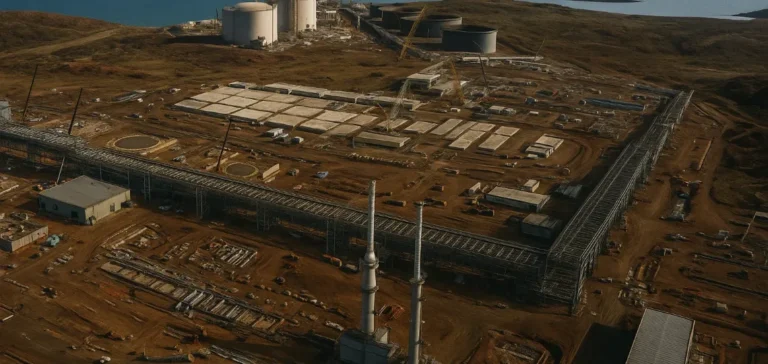The French company TotalEnergies has confirmed its intention to resume operations this summer on its major liquefied natural gas (LNG) project in Mozambique, suspended since 2021 due to security concerns. The group’s Chairman and Chief Executive Officer, Patrick Pouyanné, made this announcement during the recent Energy Summit held in Tokyo, Japan. The project, located in the offshore region designated Area 1, aims to exploit the Golfinho and Atum gas fields. The construction also includes the establishment of a liquefaction plant with two production units, capable of producing approximately 13.12 million tonnes of LNG per year.
Major economic stakes
The project represents an estimated investment of $20bn and constitutes a significant potential lever for the Mozambican economy. TotalEnergies, as the main operator, holds 26.5% of the project, followed by the Japanese group Mitsui with a 20% stake. The Mozambican state-owned company Empresa Nacional de Hidrocarbonetos (ENH) holds a 15% stake. The remaining capital is shared between Indian companies and the Thai company PTTEP.
The resumption of activities comes in a context where the Mozambican gas sector is showing growing momentum. Since November 2022, Mozambique has been exporting LNG through the Coral Sul project, developed by the Italian company Eni. Recently, Mozambican authorities approved the Coral Norte project, also managed by Eni, which plans a floating liquefaction unit.
Stabilised security context
The suspension of work in 2021 followed armed attacks in the northern province of Cabo Delgado, forcing TotalEnergies to invoke a force majeure clause. The gradual improvement of security in the region now seems to have enabled the French group to consider an imminent restart. International financial partners, such as the Export-Import Bank of the United States, have recently confirmed their financial support, contributing nearly $5bn to revive operations.
According to estimates from the African Development Bank (AfDB), Mozambique could register average GDP growth of 5.2% between 2024 and 2025, driven by the extractive sector, particularly natural gas. The resumption of this major project could generate indirect positive effects on the local and regional economy, particularly in terms of employment and infrastructure.
Industrial and strategic outlook
Mozambique thus aims to position itself among the world’s leading LNG producers. This strategy benefits from a favourable context, marked by increasing international demand for liquefied natural gas, particularly in Asia and Europe. Restarting major gas projects, such as the one led by TotalEnergies, is therefore seen as crucial for the country’s economic objectives and its ambitions for industrial prominence on the global energy scene.
The final decision regarding the effective lifting of the force majeure clause remains conditioned by developments in the security situation and the definitive confirmation of international financial support.






















